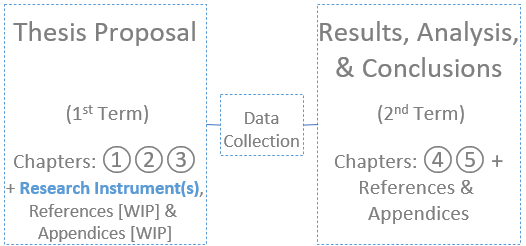
Thesis 1(A)
“My hope for you is that you will quickly come to see that a thesis is all about (1) setting up a study that includes variables configured as a conceptual framework with hypotheses about the relationships among the variables, then (2) systematically measuring the variables in a way that is valid and reliable so that you can use data from the measurements in statistical analyses, the results of which (3) tell you whether a relationship exists among the variables. We do these careful measurements and statistical analyses so that we can (4) make a proposition about the Truth; for example: ‘If we do X, then Y will happen.'”
-SMH
Accelerating Understanding: The Three Stages of Learning to Write a Thesis Proposal
At almost every graduate school in the world…
- the thesis proposal (or research proposal) you wrote in your application only serves to get you admitted to the university;
- the thesis proposal (or research proposal) you wrote after the academic orientation only serves to get you matched with a professor;
- the thesis proposal you write under the guidance of your professor in a course like Thesis 1(A) is the actual, formal Thesis Proposal.
Why does almost every graduate school in the world operate like this? Because an actual, formal Thesis Proposal needs to conform to certain academic standards that most graduate students do not learn about until after they start their Program of Study.
I have written this page to help you understand why your thesis topic will almost certainly change once you enroll and begin your Program of Study. Additionally, I have written this page to help you understand that the first three chapters of a Master Thesis are the Thesis Proposal; the last two chapters of a Master Thesis are the Results, Analysis, and Conclusions. The figure below is intended to help you understand the need to complete your Thesis Proposal in the first term.
Master Thesis

The first step in writing a Thesis Proposal is understanding deeply what a Master Thesis is. Fundamentally, a Master Thesis has five chapters. The contents of the chapters are highly specified; see this outline for details. As indicated in the figure above, the first three chapters plus any Research Instruments (i.e. the tools you will use to collect data), References (WIP=Work-in-Progress), and Appendices (Work-in-Progress) constitute the Thesis Proposal. In this version of the Thesis 1(A) course, each graduate student formally presents and defends his/her Thesis Proposal in Session 13. Before proceeding to the data collection stage, a graduate student must receive a “green light” from his/her advisor. Additionally, if a graduate student intends to survey his/her colleagues, they need to obtain permission from their employer.
Three Stages of Learning to Write a Thesis Proposal
In my experience, most graduate students need to pass through three stages (described below) before they are ready to understand what a Master Thesis is….
Stage 1: Valley of Assumptions
- You assume you know what a thesis is, but actually you do not know what a thesis is or how to write one. This means you cannot write Chapter 01. (Note: You were probably thinking that writing a longish report = “a thesis.” Most people make that mistake).
- You assume that you have a Problem that can be the foundation of your thesis, but actually you have not specified a Problem in a measurable way that can be connected to the academic literature, nor do you know what the academic literature is. Nor do you know what a literature review is. This means you cannot write Chapter 02.
- You assume that you know what empirical research in the field of management is, but actually you do not know what the scientific method is, nor do you know how to design and conduct an efficient and effective study. This means that you cannot write Chapter 03.
- You are thinking, “Who me? I am not in the Valley of Assumptions!” You are thinking this way because you do not know what you do not know. Note: When you start reflecting on things like what you do and do not know and whether what you know and do not know are impacting your understanding of Reality, then you are engaging in something called metacognition. Metacognition is very important for graduate students…. and for leaders. I want you to engage in metacognition frequently so please make it a habit.
Stage 2: Valley of Despair
- You realize that what you thought was a thesis is actually a report.
- You further realize that a report is not a thesis and that you must submit a thesis in order to graduate.
- You are now aware of the fact that what you were assuming in the Valley of Assumptions was not at all correct. And you understand that the professor and the university are going to continue to insist that you write an academic thesis that is rigorous and relevant and which meets certain standards of quality and integrity.
- You are thinking, “Woe is me. I WAS in the Valley of Assumptions and now I am in the Valley of Despair.” [insert heavy sigh about here…] You are also thinking, “At least, metacognitively speaking, I am now aware of the fact that I am in the Valley of Despair!” [Insert wan, ironic smile about here].
Stage 3: Door at the Entrance of the Valley of Understanding, Hope & Hard Work
- You understand what a thesis is, you understand why you could not write Chapters 01, 02, or 03 until now, and you agree to use the outline and various templates provided in this course in order to write your thesis.
- You are – with help from your Professor – ready to begin the process of defining a Problem in a measurable way, specifying a Conceptual Framework, grounding it in Theory (which converts the Conceptual Framework into a Model), connecting the Model to academic literature via a Literature Review, and specifying a Research Design that is “doable” in the allotted time.
- You are ready to begin writing multiple drafts which you are very confident will start out weak (possibly even horribly bad if you are an overachiever), but will rapidly improve with time, feedback, and effort.
- You are thinking, “I am ready! Now, how do I open the door at the entrance of the Valley of Understanding, Hope, & Hard Work?” Note: I am so happy you are thinking this way! I have been waiting for new Team members who think like you do. The key to the door at the entrance of the Valley of Understanding, Hope & Hard Work has always been within you. Just as my teachers opened the door for me, I now open the door for you. But, you are the one who must choose to go through the door and complete the journey. Are you ready?

“A hero ventures forth from the world of common day into a region of supernatural wonder: Fabulous forces are there encountered and a decisive victory is won: The hero comes back from this mysterious adventure with the power to bestow boons upon his or her fellow citizens.”
― Joseph Campbell, The Hero With a Thousand Faces
The Key to Success in Thesis 1(A)

“Management researchers are… measuring Reality, one variable at a time!“
SMH
To succeed in this Course you need to embrace your identity as a Management Researcher (without giving up your Professional identity) and you need to shift the way you perceive the world such that you are comfortable
1) thinking via theories, models, and conceptual frameworks with a view to
2) describing and measuring and statistically testing the hypothesized relationships among Independent and Dependent Variables (and possibly other types of variables), with the aim of
3) building, testing, refining, and/or extending theory associated with Management and Organizations, so that
4) implications from your research can guide practicing Managers and Policy Makers, and results from your research can help fellow Management Researchers advance their research projects.
Beyond the four points listed above, it is also important for you to take initiative and to maintain forward momentum.
Course Description
This course facilitates the design of a Master Thesis Research Project.
The Learning Objective of this course is to write – and successfully defend – a Thesis Proposal; that is, the first three chapters of a Master Thesis:
I. Chapter ONE – Introduction
II. Chapter TWO – Literature Review, and
III. Chapter THREE – Research Design, Data, Methods, & Limitation, plus
Research Instruments (i.e. the tools that students intend to use to collect data),
References (WIP), and any supporting
Appendices (WIP).
Once a student has successfully defended their Thesis Proposal and received a “green light” from the Professor, then the student will begin collecting data.
Grading Rubric
Final grades in Thesis 1(A) will be determined as follows:
• Chapter 01 = 20%
• Chapter 02 = 5%
• Chapter 03 = 5%
• Research Instrument(s) = 20%
• Thesis Proposal Defense Slide Deck = 10%
• In-Class Thesis Proposal Defense Presentation = 10%
• Degree to Which Assignments Are Consistently Submitted Before the Deadline = 15%
• Degree to Which You Consistently Help Your Thesis 1(A) Classmates to Learn in Class and Outside of Class = 15%.
Note: This last measure is very important to me. In this course, you are not competing with anyone but yourself and Time. Helping others to Learn is a great way to deepen your own learning and strengthen the bonds of friendship.
More details will be provided on the university syllabus and in the first class.